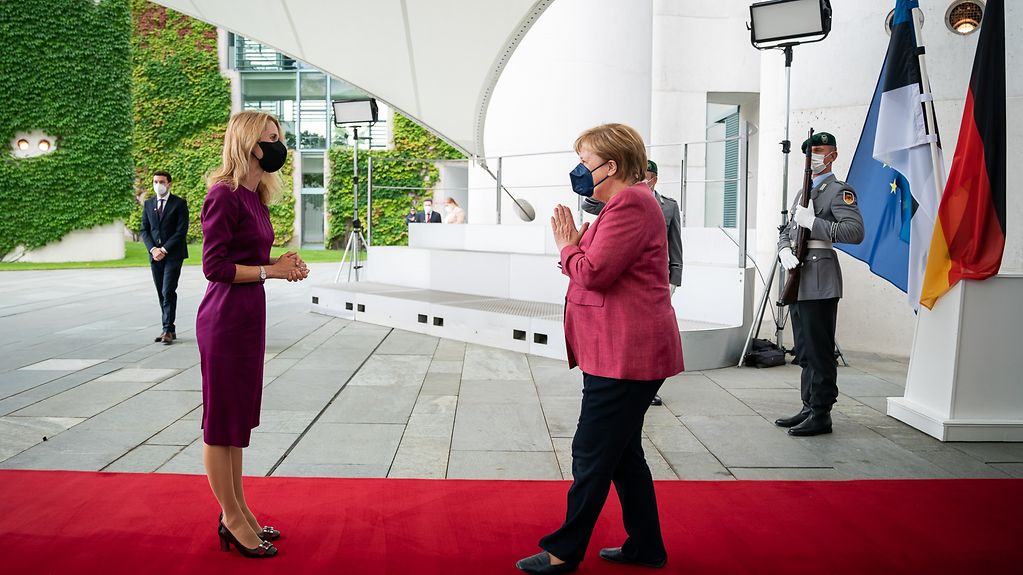The Prime Minister of Estonia visits Berlin
An inaugural visit during a pandemic is still something of a special event. This was what Estonia’s Prime Minister Kallas remarked when she was greeted by Federal Chancellor Merkel at the Chancellery, where she received a very warm welcome, though no military honours due to the pandemic. The situation in Afghanistan was a major issue at the meeting.
3 min reading time

Federal Chancellor Merkel welcomed Estonian Prime Minister Kallas at the Federal Chancellery.
Photo: Federal Government/Kugler
The scaled down diplomatic protocol did not stand in the way of Germany’s sound relations with Estonia, which have been “essentially free of tension” since the country gained its independence 30 years ago. This year marks the 100th anniversary of the establishment of diplomatic relations between Estonia and Germany, remarked Federal Chancellor Angela Merkel at the press conference after her meeting with Prime Minister Kaja Kallas. The two heads of government discussed urgent international issues, first and foremost the situation in Afghanistan.
Talks dominated by the subject of Afghanistan
The Federal Chancellor started the press conference following the joint working lunch by explaining the current situation in Kabul, where Federal Armed Forces continue to provide evacuation flights for German nationals as well as Embassy staff and aid personnel. “A great many lives have already been saved,” said Merkel. But the delicate situation in Afghanistan and the anticipated movement of civil war refugees from the country confronted the European Union with fresh challenges, she added. Failure to agree on a common refugee policy since 2015 was a “weak point”, she noted.
In this context, Merkel also referred to the situation at the borders with Belarus, where numerous migrants were seeking to enter the European Union . According to both heads of government, however, the situation on the border with Lithuania was caused by “hybrid aggression” on the part of Belarusian leader Lukashenko. The Federal Chancellor said that she “condemned” the fact that Lukashenko was “exploiting refugees” to call the security of the EU into question. “This is an attack on all of us”, said Merkel.
The talks also touched on the tense relations with Russia: Estonia has a large Russian-speaking minority (about a quarter of its approximately 1.3 million inhabitants). There were still major challenges here, not least due to the conflict in Ukraine, said the Federal Chancellor, adding that she and Prime Minister Kallas had coordinated their positions on this issue. She was still working to arrive at a diplomatic solution, she said.
[video]
Estonia leads the way in digitalisation
Another topic of discussion was the fight against the COVID-19 pandemic, which remained an ongoing challenge, despite progress with vaccinations, said Merkel. The pandemic had also shown how important a well-developed digital infrastructure was, she noted. By comparison with the smallest and northernmost of the three Baltic states, said Merkel, “Germany still has a long way to go here.”
Forests, islands, meteorites – here you can find out five thingsyou didn’t know about Estonia.
An impressive 99 percent of public enquiries and services in Estonia can now be handled online – 24 hours a day, seven days a week. On the subject of digitalisation, the Estonian Prime Minister recalled that NATO’s Cyber Defence Center was also located in the Estonian capital of Tallinn. Issues of IT security and the threat of hybrid attackers should be tackled jointly, she said.
At the last parliamentary elections in Estonia in 2019, 43.8 percent of voters cast their ballot by mouse click from their own computer(European Parliament Elections: 46.7 percent). This is why it is so crucial for Germany to engage in dialogue with Estonia on the status and implementation of digitalisation. This particularly includes the areas of e-government, e-health and e-education.
Prime Minister Kallas thanked the Federal Chancellor for her collaboration during her years in office. With Merkel, said Kallas, Germany “exemplified European responsibility”, especially during the numerous crises of recent years. Estonia had been proud to be able to work alongside Germany on the United Nations Security Council in 2020, she said. There was agreement that the top priority in Afghanistan now was to prevent human rights violations against women and girls, added Prime Minister Kallas.
Kaja Kallas, born in Tallinn in 1977, studied law at the University of Tartu. Since 2018 she has been the leader of the liberal Estonian Reform Party (Eesti Reformierakond), which was founded by her father Siim Kallas in 1994. She was a member of the European Parliament from 2014 to 2018. Kallas has been Estonia’s first female prime minister since 26 January 2021.